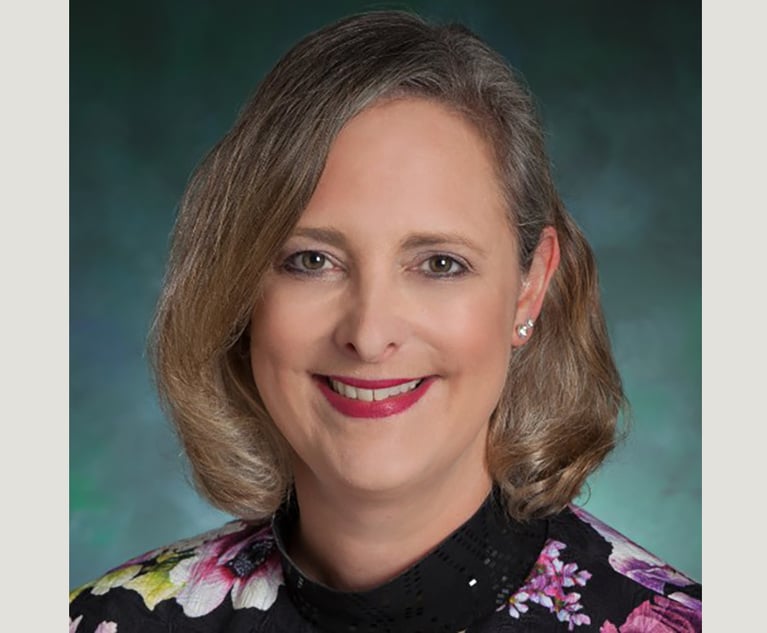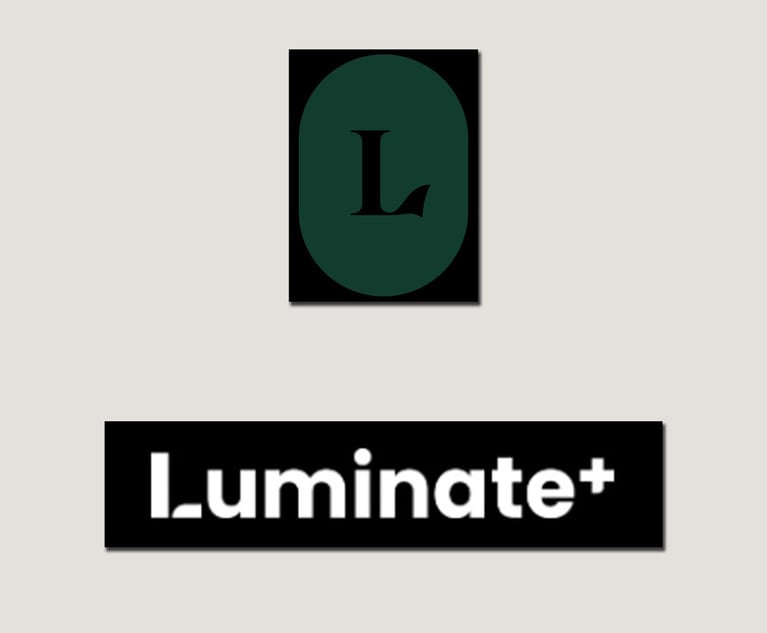With Name Change, Redskins' In-House Counsel Must Consider Trademark Uses, Sponsorship Agreements
"In the sports world, particularly in the NFL, there is value and activation around a team's name and logo," Andrew Lee, a partner at Foley & Lardner in New York, said.
July 15, 2020 at 07:19 PM
5 minute read
 Washington Redskins host Atlanta Falcons at FedEx Field Stadium in Largo, Maryland. Photo: Jamie Lamor Thompson/Shutterstock.com
Washington Redskins host Atlanta Falcons at FedEx Field Stadium in Largo, Maryland. Photo: Jamie Lamor Thompson/Shutterstock.com
As the Washington Redskins contemplate what to call themselves for the 2020-2021 season and beyond, its in-house counsel will have to consider how the name change will impact sponsorships and merchandising of vintage jerseys.
The team announced Monday that it will be retiring the Redskins name and logo and is in the process of coming up with a new name. The team's general counsel, Will Rawson, did not respond to a request for comment for this story. A spokesperson for the team said no one will be available to comment until the name-changing process is completed.
The rebranding process will be much like any other corporate name change, Andrew Lee, of counsel at Foley & Lardner in New York and former general counsel of the New York Jets, said.
"In the sports world, particularly in the NFL, there is value and activation around a team's name and logo," Lee said.
Legally, there is a good reason for not having retired the Redskins name and logo. The name and logo have been a trusted source to the consuming public, Lee said.
"But there's a historical meaning that predates that use and offends a growing segment of that consuming public, so the entity is also perceived as being a source or origin of that offense—a good reason to make a change regardless of whether the courts say you can keep the name as a registered trademark," Lee said.
Other teams that have been accused of using offensive Native American names have stuck with those names. A spokesperson for the Cleveland Indians referred Corporate Counsel to a statement made July 3, when the Redskins announced it was reviewing the name. The team said it recognizes the name is the most visible way it connects with the community. The statement said the team is committed to improving on issues of social justice.
"We are committed to engaging our community and appropriate stakeholders to determine the best path forward with regard to our team name," the Cleveland Indians said in the statement.
A spokesperson for the Atlanta Braves said the team has had a long-standing relationship with the Native American community and through its conversations with that community found "changing the name of the Braves is not under consideration or deemed necessary."
The other National Football League team with a Native American logo, the Kansas City Chiefs, did not respond to a request for comment.
Keeping a longstanding name does have benefits. The legal department may need to reevaluate agreements the team made with sponsors.
"Sponsors who are in the middle of deals are invested in the sponsorship agreement and process, not only financially but from the perspective of programming and logistics," Lee said. "Does the sponsor feel the assets that are going to be delivered live up to the assets that they signed up for in the original agreement?"
In this instance, Lee said, the decision to retire the name shows good faith to sponsors who, in large part, want to show they are on the side of social justice.
Even with the goodwill the team may develop with fans and sponsors from changing the name, the legal department will need to consider whether or not it will continue to hold onto the Redskins trademark for merchandising purposes.
"Are they going to abandon those rights for what could be vintage memorabilia?" Richard Assmus, a partner at Mayer Brown in Chicago, said.
There still may be a market for a John Riggins Super Bowl jersey, Assmus said. It is unclear if the team will continue to sell old jerseys to fans. If they do not, they risk losing the trademark and cannot enforce rights on counterfeit jerseys.
"In an ordinary name change, you might make some use of the old mark in the new one," Assmus said. "However, this was essentially a slur."
The team will also have to make sure the trademark can be used globally as the NFL has begun to gain traction overseas.
Assmus said there is irony in the U.S. Supreme Court making it easier to trademark offensive names and companies are now forced to contend with societal demands. In Matal v. Tam, the Supreme Court found Simon Tam, an Asian American, was allowed to trademark the name of his band, The Slants, even it if was offensive.
"I think there is a nice irony that a lot of the legal attempts to get the Redskins to change their name by trying to attack their trademark rights ultimately failed," Assmus said. "But it was a part of a broader societal change that made companies decide they can't afford to keep these types of names."
This content has been archived. It is available through our partners, LexisNexis® and Bloomberg Law.
To view this content, please continue to their sites.
Not a Lexis Subscriber?
Subscribe Now
Not a Bloomberg Law Subscriber?
Subscribe Now
NOT FOR REPRINT
© 2025 ALM Global, LLC, All Rights Reserved. Request academic re-use from www.copyright.com. All other uses, submit a request to [email protected]. For more information visit Asset & Logo Licensing.
You Might Like
View All
Global Software Firm Trying to Jump-Start Growth Hands CLO Post to 3-Time Legal Chief

In-House Legal Network The L Suite Acquires Legal E-Learning Platform Luminate+

Up-and-Comer Scores First Legal Chief Post With Baltimore Orioles, the Team He Cheered for as Kid

Ad Agency Legal Chief Scores $12M Golden Parachute in $13B Sale to Rival
3 minute readTrending Stories
- 15th Circuit Considers Challenge to Louisiana's Ten Commandments Law
- 2Crocs Accused of Padding Revenue With Channel-Stuffing HEYDUDE Shoes
- 3E-discovery Practitioners Are Racing to Adapt to Social Media’s Evolving Landscape
- 4The Law Firm Disrupted: For Office Policies, Big Law Has Its Ear to the Market, Not to Trump
- 5FTC Finalizes Child Online Privacy Rule Updates, But Ferguson Eyes Further Changes
Who Got The Work
J. Brugh Lower of Gibbons has entered an appearance for industrial equipment supplier Devco Corporation in a pending trademark infringement lawsuit. The suit, accusing the defendant of selling knock-off Graco products, was filed Dec. 18 in New Jersey District Court by Rivkin Radler on behalf of Graco Inc. and Graco Minnesota. The case, assigned to U.S. District Judge Zahid N. Quraishi, is 3:24-cv-11294, Graco Inc. et al v. Devco Corporation.
Who Got The Work
Rebecca Maller-Stein and Kent A. Yalowitz of Arnold & Porter Kaye Scholer have entered their appearances for Hanaco Venture Capital and its executives, Lior Prosor and David Frankel, in a pending securities lawsuit. The action, filed on Dec. 24 in New York Southern District Court by Zell, Aron & Co. on behalf of Goldeneye Advisors, accuses the defendants of negligently and fraudulently managing the plaintiff's $1 million investment. The case, assigned to U.S. District Judge Vernon S. Broderick, is 1:24-cv-09918, Goldeneye Advisors, LLC v. Hanaco Venture Capital, Ltd. et al.
Who Got The Work
Attorneys from A&O Shearman has stepped in as defense counsel for Toronto-Dominion Bank and other defendants in a pending securities class action. The suit, filed Dec. 11 in New York Southern District Court by Bleichmar Fonti & Auld, accuses the defendants of concealing the bank's 'pervasive' deficiencies in regards to its compliance with the Bank Secrecy Act and the quality of its anti-money laundering controls. The case, assigned to U.S. District Judge Arun Subramanian, is 1:24-cv-09445, Gonzalez v. The Toronto-Dominion Bank et al.
Who Got The Work
Crown Castle International, a Pennsylvania company providing shared communications infrastructure, has turned to Luke D. Wolf of Gordon Rees Scully Mansukhani to fend off a pending breach-of-contract lawsuit. The court action, filed Nov. 25 in Michigan Eastern District Court by Hooper Hathaway PC on behalf of The Town Residences LLC, accuses Crown Castle of failing to transfer approximately $30,000 in utility payments from T-Mobile in breach of a roof-top lease and assignment agreement. The case, assigned to U.S. District Judge Susan K. Declercq, is 2:24-cv-13131, The Town Residences LLC v. T-Mobile US, Inc. et al.
Who Got The Work
Wilfred P. Coronato and Daniel M. Schwartz of McCarter & English have stepped in as defense counsel to Electrolux Home Products Inc. in a pending product liability lawsuit. The court action, filed Nov. 26 in New York Eastern District Court by Poulos Lopiccolo PC and Nagel Rice LLP on behalf of David Stern, alleges that the defendant's refrigerators’ drawers and shelving repeatedly break and fall apart within months after purchase. The case, assigned to U.S. District Judge Joan M. Azrack, is 2:24-cv-08204, Stern v. Electrolux Home Products, Inc.
Featured Firms
Law Offices of Gary Martin Hays & Associates, P.C.
(470) 294-1674
Law Offices of Mark E. Salomone
(857) 444-6468
Smith & Hassler
(713) 739-1250






